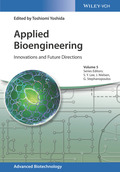Applied Bioengineering
Innovations and Future Directions
Advanced Biotechnology (Band Nr. 5)

1. Auflage März 2017
XXVI, 624 Seiten, Hardcover
46 Tabellen
Handbuch/Nachschlagewerk
Kurzbeschreibung
Hochaktuelle und zukünftige Ausrichtungen von fünf Kernbereichen der Biotechnik, die für eine nachhaltige und innovative Produktion von unmittelbarer Bedeutung sind.
Jetzt kaufen
Preis: 199,00 €
Preis inkl. MwSt, zzgl. Versand
Euro-Preise für Wiley-VCH- und Ernst & Sohn-Titel sind nur für Deutschland gültig. In EU-Ländern gilt die lokale Mehrwertsteuer. Portokosten werden berechnet.
A comprehensive overview of the topic, highlighting recent developments, ongoing research trends and future directions.
Experts from Europe, Asia and the US cover five core areas of imminent importance to the food, feed, pharmaceutical and water treatment industries in terms of sustainable and innovative processing and production. In the field of enzyme engineering, they summarize historic developments and provide an overview of molecular enzyme engineering, while also discussing key principles of microbial process engineering, including chapters on process development and control. Further sections deal with animal and plant cell culture engineering. The final section of the book deals with environmental topics and highlights the application of bioengineering principles in waste treatment and the recovery of valuable resources.
With its cutting-edge visions, extensive discussions and unique perspectives, this is a ready reference for biotechnologists, bioengineers, bioengineers, biotechnological institutes, and environmental chemists.
PART I - ENZYME TECHNOLOGY
2. Enzyme Technology: History and Current Trends
3. Molecular Engineering of Enzymes
4. Biocatalytic Process Development
5. Development of Enzymatic Reactions in Miniaturized Reactors
PART II - MICROBIAL PROCESS ENGINEERING
6. Monitoring of Fermentation Processes
7. Omics-Integrated Approach for Metabolic State Analysis of Microbial Processes
8. Process Control and PAT Management of Microbial Cultivation
PART III - PLANT CELL CULTURE ENGINEERING
9. Contained Molecular Farming Using Plant Cell and Tissue Cultures
10. Bioprocess Engineering of Plant Cell Suspension Cultures
11. The Role of Bacteria in Phytoremediation
PART IV - ANIMAL CELL CULTURES
12. Cell Line Development for Biomanufacturing Processes
13. Medium Design, Culture Management and the PAT Initiative
14. Advanced Bioprocess Engineering: Fed-Batch and Perfusion Processes
PART V - ENVIRONMENTAL BIOENGINEERING
15. Treatment of Industrial and Municipal Wastewater: An Overview about Basic and Advanced Concepts
16. Treatment of Solid Waste
17. Energy Recovery from Organic Waste
18. Microbial Removal and Recovery of Metals from Wastewater
19. Sustainable Use of Phosphorus Through Bio-based Recycling
Sang Yup Lee is Distinguished Professor at the Department of Chemical and Biomolecular Engineering at the Korea Advanced Institute of Science and Technology (KAIST). He is currently the Director of the Center for Systems and Synthetic Biotechnology, Director of the BioProcess Engineering Research Center, and Director of the Bioinformatics Research Center. He has published more than 500 journal papers, 64 books and book chapters, and more than 580 patents (either registered or applied). He received numerous awards, including the National Order of Merit, the Merck Metabolic Engineering Award, the ACS Marvin Johnson Award, Charles Thom Award, Amgen Biochemical Engineering Award, Elmer Gaden Award, POSCO TJ Park Prize, and HoAm Prize. He currently is Fellow of American Association for the Advancement of Science, the American Academy of Microbiology, American Institute of Chemical Engineers, Society for Industrial Microbiology and Biotechnology, American Institute of Medical and Biological Engineering, the World Academy of Science, the Korean Academy of Science and Technology, and the National Academy of Engineering of Korea. He is also Foreign Member of National Academy of Engineering USA. He is currently honorary professor of the University of Queensland (Australia), honorary professor of the Chinese Academy of Sciences, honorary professor of Wuhan University (China), honorary professor of Hubei University of Technology (China), honorary professor of Beijing University of Chemical Technology (China), and advisory professor of the Shanghai Jiaotong University (China). Lee is the Editor-in-Chief of the Biotechnology Journal and Associate Editor and board member of numerous other journals. Lee is currently serving as a member of Presidential Advisory Committee on Science and Technology (Korea).
Jens Nielsen is Professor and Director to Chalmers University of Technology (Sweden) since 2008. He obtained an MSc degree in Chemical Engineering and a PhD degree (1989) in Biochemical Engineering from the Technical University of Denmark (DTU) and after that established his independent research group and was appointed full Professor there in 1998. He was Fulbright visiting professor at MIT in 1995-1996. At DTU, he founded and directed the Center for Microbial Biotechnology. Jens Nielsen has published more than 350 research papers, co-authored more than 40 books and he is inventor of more than 50 patents. He has founded several companies that have raised more than 20 million in venture capital. He has received numerous Danish and international awards and is member of the Academy of Technical Sciences (Denmark), the National Academy of Engineering (USA), the Royal Danish Academy of Science and Letters, the American Institute for Medical and Biological Engineering and the Royal Swedish Academy of Engineering Sciences.
Professor Gregory Stephanopoulos is the W. H. Dow Professor of Chemical Engineering at the Massachusetts Institute of Technology (MIT, USA) and Director of the MIT Metabolic Engineering Laboratory. He is also Instructor of Bioengineering at Harvard Medical School (since 1997). He received his BS degree from the National Technical University of Athens and his PhD from the University of Minnesota (USA). He has co-authored approximately 400 research papers and 50 patents, along with the first textbook on Metabolic Engineering. He has been recognized by numerous awards from the American Institute of Chemical Engineers (AIChE) (Wilhelm, Walker and Founders awards), American Chemical Society (ACS), Society of industrial Microbiology (SIM), BIO (Washington Carver Award), the John Fritz Medal of the American Association of Engineering Societies, and others. In 2003 he was elected member of the National Academy of Engineering (USA) and in 2014 President of AIChE.


